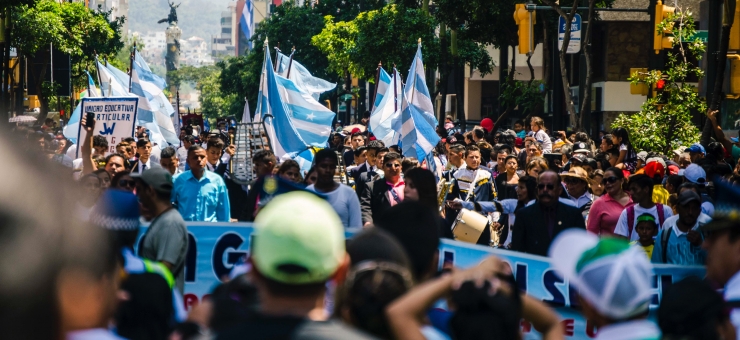The IMF, Macri and the failure of market fundamentalism

Eliminating capital controls was one of Mauricio Macri’s first measures, signalling an embrace of pro-market policies and a desire to woo foreign investors. His administration has been defined by the influence of the International Monetary Fund. Together, the Fund and Macri promised prosperity but delivered collapse. With slim chances of re-election due to the failure of the IMF loan programme, re-instituting capital controls might be one of his government’s last measures.
Upon entering office, Macri quickly settled the vulture fund dispute that had kept Argentina away from international credit markets. After the settlement, international markets cheered as borrowing in foreign currency increased. The economy soon ran into trouble. Contrary to the blame placed on the previous government, it cannot be denied that the Macri administration inherited a country with a low external debt.
Macri eagerly sought an IMF loan, first lobbying US Treasury to ensure approval. Christine Lagarde, then Managing Director of the Fund, staked the institution’s reputation and a large share of its resources on a return to Argentina. The result was a record-breaking loan package of $50 billion, quickly increased to $57 billion as problems immediately arose. This loan programme was supposed to be different than Argentina’s previous loan, a spectacular and infamous failure ending in economic depression and default.
It was predictable that austerity would push Argentina into recession, and that the growth predictions of the IMF would be missed. As this became reality, the Fund doubled down on its prescriptions. Poverty increased, inflation and unemployment rose, and tens of thousands of companies disappeared. When the Macri administration desperately reacted with measures including price controls, the IMF reaffirmed support and looked the other way at policies it would normally oppose. To make matters worse, a large chunk of the funds received from the IMF were destined to finance capital flight.
Macri’s defeat in the primary elections made it impossible to deny the failure of “pro-market” policies implemented under the IMF programme. The election loss led to further depreciation of the peso and an acknowledgment that Argentina needed to restructure its debt. The central bank subsequently bled more US dollar reserves attempting to meet the increased demand for dollars and defend the peso, again allowing dollar reserves to finance capital flight. After losing $3 billion dollars in two days and running dangerously low on reserves, Macri brought back capital controls.
Argentina is yet again an example of the damage done by the market fundamentalism of the IMF. As trade unions stressed since the beginning of economic trouble in 2018, the focus needs to be on a productive economy and consumer demand underpinned by living wages for workers, not just the wellness of the financial sector and foreign investors. An alternative economic strategy is needed that stimulates the real economy and fosters sustained growth.
Today, the question is what will happen to unsustainable debt. It is timely to recall Fernando de la Rua’s “megacanje”, which only made matters worse. As questions loom over the future of the IMF loan and the timing of restructuring, it is time to stop repeating mistakes. Argentina’s economy needs room to breathe and recover, not more austerity. Any good-faith creditor should agree to this sensible approach.
Rubén Cortina is President of UNI Global Union. Leo Baunach is Director of the International Trade Union Confederation/Global Unions Washington Office
Original: https://www.pagina12.com.ar/216815-el-fracaso-del-fundamentalismo-del-mercado

